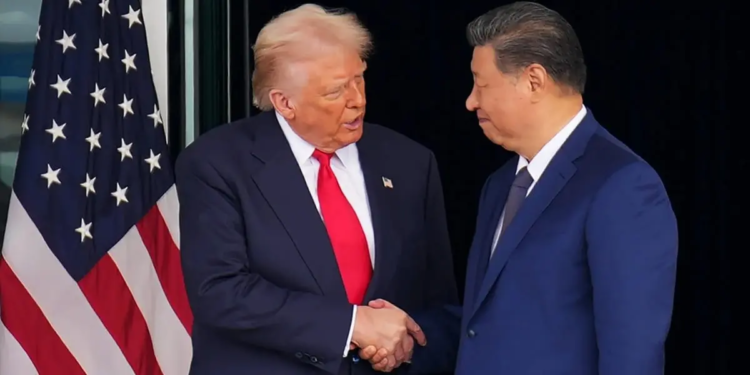After “incredible discussions” between Donald Trump and Xi Jinping, Washington and Beijing announce a one-year agreement on tariffs, rare earths and the fight against fentanyl. A strategic truce with effects far beyond the two powers.
A truce with a taste of revenge
Donald Trump claimed that a “one-year agreement” had been reached with Xi Jinping, following talks he described as “incredible”. The agreement provides for a partial reduction in American customs duties on Chinese imports, in return for commitments from Beijing on three areas: cooperation against fentanyl, the resumption of purchases of American soybeans, and the maintenance of exports of rare earths.
This compromise marks a lull in the commercial confrontation that has opposed the two powers since 2018. But, as several analysts point out, it is a tactical pause rather than lasting appeasement.
Fentanyl, a new diplomatic lever
The most unexpected aspect of this deal concerns the fight against trafficking in fentanyl, this synthetic opioid causing tens of thousands of deaths each year in the United States.
China, often accused by Washington of tolerating the export of chemical precursors, has pledged to strengthen control of its factories and cooperate more closely with American agencies. In exchange, the United States reduced tariffs on certain chemicals and pharmaceuticals.
For observers, this concession illustrates the highly transactional dimension of the “Trump deal”: a barter diplomacy, where public health becomes a bargaining chip.
Supply chains breathe
Beijing’s confirmation of the maintenance of exports of rare earths – essential to high-tech industries – immediately calmed the markets. Prices have stabilized, and Western manufacturers fearing a shortage are regaining confidence.
But this truce could also slow down the diversification efforts initiated by several countries in Southeast Asia and Latin America, which hoped to benefit from Sino-American decoupling. In practice, the deal reinforces China’s centrality in global supply chains, at least for the coming year.
The return of American soy
On the agricultural front, China has agreed to relaunch its imports of American soybeans, suspended or reduced since the trade war.
This very symbolic gesture aims to calm American farmers – a key electorate for Trump – while temporarily rebalancing trade flows.
But it will have collateral effects: competition promises to be tougher for Brazil and Argentina, which became China’s main suppliers during the years of tensions. For these countries, this one-year deal represents a loss of market share, even if it remains limited in time.
A fragile relaxation, but valuable for the markets
Asian and European stock markets immediately reacted positively to the announcement of the deal. Oil remained stable, a sign of a relative return to predictability. But investors remain cautious: the agreement only lasts one year, with no clear renewal mechanism.
Behind the scenes, American advisors admit that it is not a structuring treaty, but a “strategic breathing space”. In other words, a way to calm the markets before the 2026 American election.
Also read:








